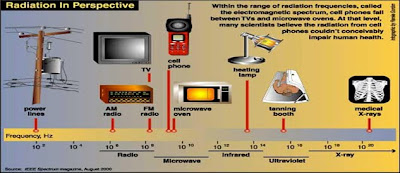★ Radiation is a moving from of energy whereby the energy emitted by one body travels in a straight line through a medium or through space.
★ Radiation travels in the form of waves
★ Sources such as the sun, microwave ovens, radio antennas, nuclear reactor, power lines etc.
 |
| The range of electromagnetic radiation and the sources of radiation |
Types of Radiation:
Radiation and Cancer:
The types of cancers are associated with specific part of the body that is exposed; such scenario can be applied in radiation therapy whereby people who gets a neck radiation therapy would not be expected to have risk of cancers in other parts of body which are not exposed to the radiation.
 |
| Sensitivity of different human body parts towards radiation |
Those under high risk of radiation exposure are radioactive plant workers, children, infants and fetus in the womb because they are more sensitive to radiation. Another factor is genetic factor, whereby a person may have gene changes (inherited) which makes their body cells more susceptible to radiation damage.
Female adolescents frequently exposed to radiation have a higher risk for breast cancer in the future due to the actively dividing mammary gland cells in adolescents compared to other stages of life. Even though higher doses of radiation may cause cancer, low radiation may also poses some risk of cancer and hereditary effect, the only difference is that the risk is higher for higher radiation exposures.
There are several evidence to support the relationship between radioactivity and cancer:
a) Studies of atomic bomb survivors in Japan
b) People exposed during the Chernobyl nuclear accident
c) People treated with high doses of radiation for cancer and other conditions, and people exposed to high levels of radiation at work, such as uranium miners.
Videos on Chernobyl radioactive incident and Fukushima Japan incident (Click!)


Hi, could you tell me about the source of the pictures used in this article?
ReplyDelete